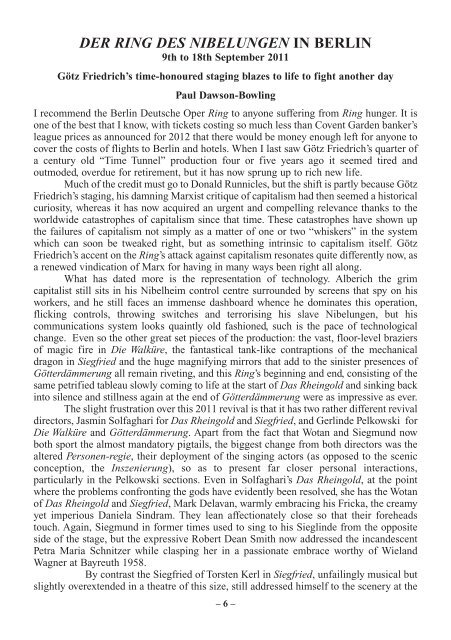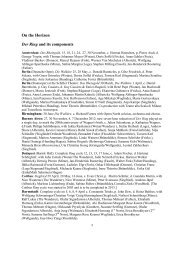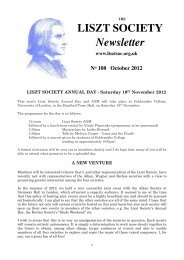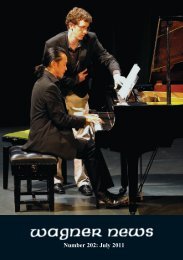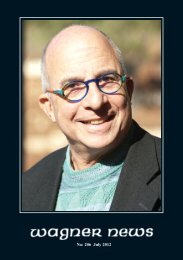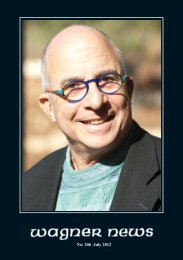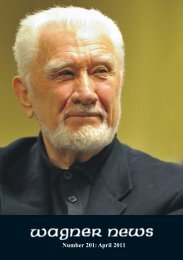(soprano) and DAVID SYRUS (piano) - Wagner Society of England
(soprano) and DAVID SYRUS (piano) - Wagner Society of England
(soprano) and DAVID SYRUS (piano) - Wagner Society of England
You also want an ePaper? Increase the reach of your titles
YUMPU automatically turns print PDFs into web optimized ePapers that Google loves.
DER RING DES NIBELUNGEN IN BERLIN<br />
9th to 18th September 2011<br />
Götz Friedrich’s time-honoured staging blazes to life to fight another day<br />
Paul Dawson-Bowling<br />
I recommend the Berlin Deutsche Oper Ring to anyone suffering from Ring hunger. It is<br />
one <strong>of</strong> the best that I know, with tickets costing so much less than Covent Garden banker’s<br />
league prices as announced for 2012 that there would be money enough left for anyone to<br />
cover the costs <strong>of</strong> flights to Berlin <strong>and</strong> hotels. When I last saw Götz Friedrich’s quarter <strong>of</strong><br />
a century old “Time Tunnel” production four or five years ago it seemed tired <strong>and</strong><br />
outmoded, overdue for retirement, but it has now sprung up to rich new life.<br />
Much <strong>of</strong> the credit must go to Donald Runnicles, but the shift is partly because Götz<br />
Friedrich’s staging, his damning Marxist critique <strong>of</strong> capitalism had then seemed a historical<br />
curiosity, whereas it has now acquired an urgent <strong>and</strong> compelling relevance thanks to the<br />
worldwide catastrophes <strong>of</strong> capitalism since that time. These catastrophes have shown up<br />
the failures <strong>of</strong> capitalism not simply as a matter <strong>of</strong> one or two “whiskers” in the system<br />
which can soon be tweaked right, but as something intrinsic to capitalism itself. Götz<br />
Friedrich’s accent on the Ring’s attack against capitalism resonates quite differently now, as<br />
a renewed vindication <strong>of</strong> Marx for having in many ways been right all along.<br />
What has dated more is the representation <strong>of</strong> technology. Alberich the grim<br />
capitalist still sits in his Nibelheim control centre surrounded by screens that spy on his<br />
workers, <strong>and</strong> he still faces an immense dashboard whence he dominates this operation,<br />
flicking controls, throwing switches <strong>and</strong> terrorising his slave Nibelungen, but his<br />
communications system looks quaintly old fashioned, such is the pace <strong>of</strong> technological<br />
change. Even so the other great set pieces <strong>of</strong> the production: the vast, floor-level braziers<br />
<strong>of</strong> magic fire in Die Walküre, the fantastical tank-like contraptions <strong>of</strong> the mechanical<br />
dragon in Siegfried <strong>and</strong> the huge magnifying mirrors that add to the sinister presences <strong>of</strong><br />
Götterdämmerung all remain riveting, <strong>and</strong> this Ring’s beginning <strong>and</strong> end, consisting <strong>of</strong> the<br />
same petrified tableau slowly coming to life at the start <strong>of</strong> Das Rheingold <strong>and</strong> sinking back<br />
into silence <strong>and</strong> stillness again at the end <strong>of</strong> Götterdämmerung were as impressive as ever.<br />
The slight frustration over this 2011 revival is that it has two rather different revival<br />
directors, Jasmin Solfaghari for Das Rheingold <strong>and</strong> Siegfried, <strong>and</strong> Gerlinde Pelkowski for<br />
Die Walküre <strong>and</strong> Götterdämmerung. Apart from the fact that Wotan <strong>and</strong> Siegmund now<br />
both sport the almost m<strong>and</strong>atory pigtails, the biggest change from both directors was the<br />
altered Personen-regie, their deployment <strong>of</strong> the singing actors (as opposed to the scenic<br />
conception, the Inszenierung), so as to present far closer personal interactions,<br />
particularly in the Pelkowski sections. Even in Solfaghari’s Das Rheingold, at the point<br />
where the problems confronting the gods have evidently been resolved, she has the Wotan<br />
<strong>of</strong> Das Rheingold <strong>and</strong> Siegfried, Mark Delavan, warmly embracing his Fricka, the creamy<br />
yet imperious Daniela Sindram. They lean affectionately close so that their foreheads<br />
touch. Again, Siegmund in former times used to sing to his Sieglinde from the opposite<br />
side <strong>of</strong> the stage, but the expressive Robert Dean Smith now addressed the inc<strong>and</strong>escent<br />
Petra Maria Schnitzer while clasping her in a passionate embrace worthy <strong>of</strong> Wiel<strong>and</strong><br />
<strong>Wagner</strong> at Bayreuth 1958.<br />
By contrast the Siegfried <strong>of</strong> Torsten Kerl in Siegfried, unfailingly musical but<br />
slightly overextended in a theatre <strong>of</strong> this size, still addressed himself to the scenery at the<br />
–6– – 6–


